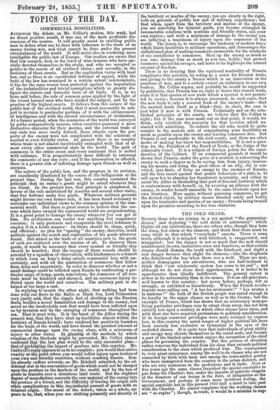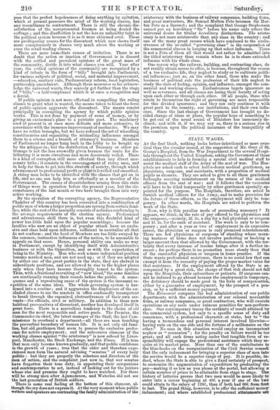THE COLD SHADE.
BESIDES those who are joining in a cry against "the goyerning- classes," and deploring " the cold shade of aristocracy". which blights all our institutions, there are others who, though they hate the slang, feel alarm at the clamour, and think that there must be some truth in that which "everybody" asserts. There is some truth, although it is mingled with falsehood, is exaggerated, and misapplied : but the danger is not so much that the mob should misinterpret its own instinctive sense and functions, as that certain classes should dismiss the truth with the falsehood, and slight a real danger because they slight the clamour,—like the shepherds who disbelieved the boy when there was a wolf. There are men, neither demagogues nor adventurers, who are half-inclined to think that " our aristocratic system has come to its end" ; and although we do not share their apprehensions, it is better to be apprehensive than blindly indifferent. The- general outcry is newer in its universality than in its causes. It is an old grievance, well known to this country ; but never before, perhaps, felt so strongly, or exhibited so hazardously. When the French revolu-• tionists were calling out, "A bas les aristocrats!" "Les aristos I la lanterns !" the bulk of the British people was sound enough in its loyalty to the upper classes as well as to the Crown; but the example of France, which has shown that an aristocracy monopo- lizing particular privileges may be swept clean away, has not been entirely lost upon a country in which other classes have risen, and with their rise have acquired pretensions to political consideration. If in foreign countries privileges were more retained by express law, in this country the social usages of higher political life have been scarcely less exclusive or tyrannical in the eyes of the excluded classes. It is quite true that individuals of great ability
and energy may elevate themselves in the social scale, and become a part of the limited order which enjoys the occupation of the chief
places for governing the country. But this process of elevation
rather removes the individual from his class than extends political consideration to the class which produced him. The consequence is very great annoyance among the well-to-do classes who are not connected by birth with land, and among the town-settled gentry who have immigrated from the country to the urban districts, and who are very numerous in the professions and in trade. Four or five years ago the same classes furnished the special constables to put down the Chartist; but, under the impulse of patriotic chagrin at the disasters of our troops in the East, of indignation at the
Government, and perhaps of some more invidious feeling, the special constable has in this present 1855 half a mind to take part with the Chartist. He almost complains that the working classes are " so supine"; though, in truth, it would be a mistake to sup-
pose that the perfect hopelessness of doing anything by agitation, which at present possesses the mind of the working classes, has any resemblance to contentment. There is still the chronic dis- satisfaction of the unrepresented freemen at being denied the suffrage ; and this disaffection is not the less an unhealthy taint in the political system because it is as it were skimmed over. These are predisposing causes for the discontent which now shows itself more conspicuously in classes very much above the working or even the retail-trading classes. • There are more immediate causes of irritation. There is no doubt that the action or inaction of Government is in discord with the settled and prevalent opinions of the great mass of the community, divide it into what classes you will. Year after year, the settled opinions of the community are recognized by a kind of tribute in the form of " bills " brought into Parliament, for various subjects of political, social, and material improvement, —education, sanitary rule, Parliamentary reform, local legislation, partnership amendment. Although these measures so far acknow- ledge the universal wants, they scarcely get further than the stage of " bills,"—a half-compliance which is at once a recognition and a denial.
If public opinion is not more effectual in compelling the ruling classes to grant what is wanted, the means taken to blunt the force of public opinion aggravate the discontent. The means consist principally in corrupting the agency by which public opinion works. This is not done by payment of sums of money, or by giving an exciseman's place to a patriotic poet. The machinery used at present is at once more delicate and more extensive, in accordance with the immense improvement of mechanics. We may have no rotten boroughs, but we have reduced the art of wheedling constituencies and organizing the misleading influences amongst them to a science and a branch of attorney's business. Members of Parliament no longer hang back in the lobby to be bought up by the whipper-in ; but the distribution of Treasury or other pa- tronage is not the less avowedly given because the route for dis- tributing it is more circuitous and more decorously veiled. There is a kind of corruption still more effectual than any direct mer- cenary bribe ; it consists in the encouragement of rising men, and in help for them to get into this stratum of society, through which advancement to professional profit or place is levelled and smoothed. A rising man looks to be identified with the classes that get on in life,- and no one can help him so effectually as a member of the Government. The causes of dissatisfaction arising from this state of things were in operation before the present year, but the cir- cumstances of the last month or two have brought them into very active working.
By the operation of the corrupting agency, the Representative Chamber of- this country has been converted into a combination of public men of whom a larger proportion are sprung from certain fami- lies, while the rest of the assembly consists of nobodies conforming to the average requirements of the election agency. Professional and adventurous skill there is, but even this doubtful kind of power has little hold upon the popular assemblage ; because the families who now are an object of popular attack have an exclu- sive and class hold upon influence, sufficient to neutralize all that do not conform ; and the herd of kembers are too little swayed by the common, instinctive influences of the nation, to be amenable to appeals on that score. Hence, personal ability can make no way in Parliament, except by identifying itself with Administrative business or with the Opposition, and so with the expectation of being in the Ministry. Men who seek a more independent position become marked men, and are not used up ; or if they are adopted by either one of the great parties in the state, they are shelved in subordinate positions, and are allowed to rise to the higher places only when they have become thoroughly tamed to the system. Thus, with a fractional recruiting of "new blood," the same families are continually running their rounds before the public. A conse- quence and a reproducing cause of the system is the incessant re- spetition of the same ideas. The whole governing system is har- dened into a routine ; and it aggravates the displeasure of the ex- cluded classes to see the masters in office confessedly incompetent to break through the organized. obstructiveness of their own ser- vants—the officials, civil or military. In addition to those now habitual provoeatives of discontent, another has developed itself in great force. There is a marvellous tendency to the choice of old men for the most responsible and active posts. The Premier, the. Commander-in-chief, the latest manager of the Staff, the last Com- missioner to overhaul a department—all these are men touching the proverbial boundary of human life. It is not only old fami- lies, but old gentlemen that seem to possess the exclusive prefer- ence for active employment; and the subversive clamour of the working classes against " the aristocracy" is now echoed by Liver- pool, Manchester, the Stock Exchange, and the Times. It is true that men only become known gradually, and that public confidence is the growth of years ; true that the older and therefore expe- rienced men form the natural advising " senatus " of every body politic : but they are properly the selectors and directors of the men .of action, and the complaint just now is, that our senatus have forgotten their true duty, in appointing their companions and contemporaries to act, instead of looking out for the juniors whose rise and promise they ought to have watched. For there will be strong men after Agamemnon, and Waterloo did not see the last generation of British soldiers.
There is some real feeling at the bottom of this clamour, al- though the cry does not express it. At the very moment when public writers and speakers are contrasting the faulty administration of the
aristocracy with the business of railway companies, building firms, and great contractors, Mr. Samuel Morton Pete becomes Sir Mor- ton Peto as a Baronet ; and the complaint that George Stephenson cannot put an hereditary " Sir" before his name only utters the universal desire for titular hereditary distinctions. The aristo.4_ eracy is not more aristocratic than any class in the country ; and one of the many great causes which have conduced to the exclu- siveness of the so-called "governing class" is the cooperation of the commercial classes in keeping up that select influence. There is not a Peto of them all that would not rather be admitted into the titled aristocracy than remain where he is to share extended influence with his whole class.
One reason why the railway, building, and contracting class, do not readily obtain access to office, is because, throughout the course of a too exclusive life, they neglect to study or to cultivate politi- cal influences ; just as, on the other hand, those who make the business of political rule the profession of their life neglect to study the state of feeling, opinion, and influence, amongst the com- mercial and working classes. Exclusiveness begets ignorance as well as severance, and all classes are losing their faculty of acting upon each other or through each other. Of all people, those who retain to themselves the right of governing are most responsible for this divided ignorance ; and they can only continue it with great peril to the country, our institutions, and their own influ- ence. Since the last change of Government has brought no de- cided change of ideas or plans, the popular hope of something to be got out of the usual round of Ministers has immensely de- clined ; and with it, if we may say so, there is a serious rise in the premium upon the political insurance of the tranquillity of the country.



































 Previous page
Previous page